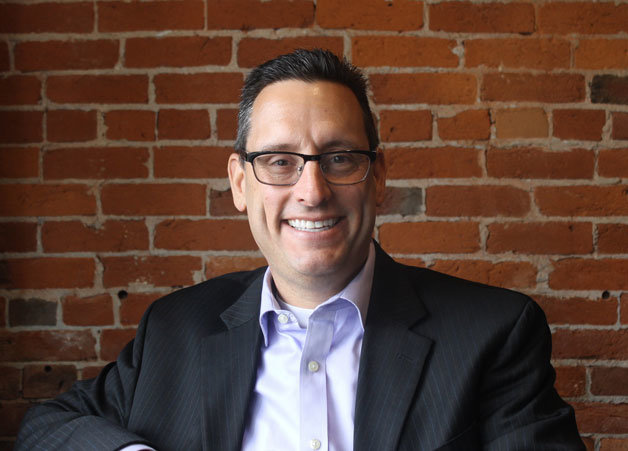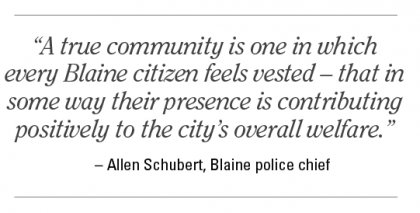 Blaine Police Department chief Allen Schubert. Photo by Stefanie Donahue
Blaine Police Department chief Allen Schubert. Photo by Stefanie Donahue
City swore in Allen Schubert on Aug. 20 at Blaine City Hall
By Stefanie Donahue
After wrapping up a two-decade long career at the Los Angeles Police Department (LAPD), this month Allen Schubert began what he anticipates will be a seamless transition into his new role as chief of the Blaine Police Department (BPD).
“In a lot of ways, there’s really no difference between a big city police officer and a police officer working in a small town,” he said. “We all have the same basic responsibilities and we all have the desire to serve the community.”
As Blaine’s police chief, Schubert said he wants to get out in the community to identify and resolve problems that negatively impact residents.
“I want to address all of the quality of life issues that affect everyone in Blaine,” he said. “After all, that’s why everyone moved here and lives here because they want to live in a small town where they don’t have to deal with the big-city problems.”
Schubert was sworn in as police chief by city clerk and assistant to the city manager Sam Crawford during a brief ceremony on August 20 at Blaine City Hall.
He was offered the position in June after being selected by the city from a pool of highly-qualified candidates, including Bellingham Police Department patrol lieutenant Don Almer and North Carolina-based Albert J. Ellis airport police chief Renado Prince.
He was lauded for his wide range of experience, stemming in part from his work in several divisions at the LAPD.
“Allen grew up in a small town and he wants to return to his roots,” said interim city manager Michael Jones, in June. “He brings extensive experience in training, policy, supervision and police work, as well as an impressive educational background.”
Jones added, “Those are great things, but, ultimately, it was sitting down for coffee and learning more about who Al is, and talking to his references that made me come to realize he is the right person for the job and a good fit for Blaine.”
Early career
Schubert served in the U.S. Navy from 1990 to 1994 as an intelligence specialist, collecting maritime and combat intelligence for various military officials.
His first job was in Chinhae, a city in South Korea with approximately 140,000 residents. He worked at a small naval base monitoring North Korean naval and merchant shipping boats for illegal contraband.
After that, he was transferred to the VS-33 Airwing Squadron (called the ‘Screwbirds’) in San Diego. The squadron was deployed on an aircraft carrier called the ‘U.S.S. Nimitz’ and he was responsible for helping pilots plan their strike missions.
His work aided Operation Southern Watch, which called on the U.S.A.F. to monitor and control the airspace in southern Iraq following the Gulf War.
As a member of the air wing, he joined the Western Pacific Cruise and for six months toured ports of call in Hong Kong and Singapore, among others.
During the cruise he was assigned to a U.N. command in Dhahran, Saudi Arabia and acted as a liaison between the carrier battle group and U.N. forces before returning back to San Diego to complete a four-year tour in 1994.
Eager to jump back into civilian life, Schubert moved to Los Angeles with a few friends.
“I had some aspirations to be a screenwriter [...] and work in Hollywood,” he said. “We all tried to get into the film industry in one aspect or the other.”
He landed a job as a production assistant at a Warner Bros. movie studio, but his fascination with working in Hollywood dwindled.
“I missed being in a uniformed service,” he said. “I missed the comradery that you have in a police department or a professional agency.” Plus, he wanted to make use of his degree in criminal justice, which he earned from Bowling Green State University in 1990.
At age 30, he applied for a job at the LAPD and got it.
Work at the LAPD
Schubert began making calls, handling cars and responding to radio reports as an LAPD patrol officer in 1999.
“I learned how to conduct myself in a professional manner when dealing with citizens and balance my role as a community law enforcer and compassionate caretaker,” he wrote on his resume.
In 2000, Schubert joined the LAPD’s bike unit and began patrolling the greater Los Angeles area in a helmet on two wheels – a role he greatly admired.
“Police officers are much more approachable when they’re on a bike or walking around,” he said. “Sometimes it’s hard for people to go up and talk to an officer when they’re in their police car.”
In 2005, Schubert became a human relations instructor teaching police recruits at the Ahmanson Recruit Training Center in Los Angeles. His lessons covered discrimination, racial bias and domestic violence, among others.
“I considered it to be a real honor that they would think of me,” he said. “After all, a lot of times for new recruits these instructors are the first people they have that are a reflection of the police department.”
Schubert assumed even greater responsibility in 2006 when he was appointed as sergeant at the West Los Angeles Community Police Station. He oversaw approximately 35 patrol officers in addition to 15-20 officers working in specialized units within a 63-square-mile jurisdiction.
Between 2012 and 2015, he served as a department-sponsored officer representative, representing officers in internal disputes, and later as an internal affairs investigator, investigating officers who were accused of violating department policy.
“It gave me a real opportunity to really understand the command staff side of the police department,” he said. “I know how to conduct impartial investigations and make sure that officers are held to a high standard.”
Schubert wore many hats throughout his career at the LAPD, including gang and robbery/homicide detective and major assault crimes and sex crimes detective. By 2018, he had obtained a master in intelligence studies from American Public University and a master of forensic science from National University.
His final position at the LAPD was lieutenant of the transit services division, which provided protection and services to an estimated 1.5 million daily users of Los Angeles County Metropolitan Transportation Authority rail lines and bus routes.
“This was probably the one job that I’ve had which gave me the greatest understanding of this [police chief] position,” he said. “I had to learn about how to create policy, deal with a budget […] and work with different department heads.”
He added, “We had a very high standard.”
Blaine vs. Los Angeles
Starting with population, Los Angeles contains an estimated 3.98 million residents, while Blaine contains an estimated 5,164 residents. Within the last 20 years, the LAPD employed an average of 10,000 police officers, while the BPD employs 11 police officers, Schubert said.
Despite that, Schubert said BPD officers still get the job done.
“People often misconstrue size for professionalism. I am extremely impressed with the level of professionalism and just the overall knowledge that these guys have,” he said. “Everyone is just so proficient in a variety of different things and I find that really impressive.”
As police chief, Schubert plans to bolster training to advance those skills.
He said one officer has already expressed interest in becoming a Drug Recognition Expert (DRE) to be able to better identify individuals who are impaired by drugs. Schubert became a DRE instructor in 2014 and was the highest-ranking DRE at the LAPD.
In time, Schubert would also like to bring a K-9 unit and bike patrols back to Blaine.
“I think that would be great for business and I can’t tell you how much more approachable police officers are on bike,” he said. From an enforcement perspective, he added, “you’d be surprised what you see on a bike that you don’t see in a police car.”
Residents should also expect to see more police officers downtown. Schubert said he wants to start a foot beat, meaning more officers will take walks in the area to develop closer relationships with residents and business owners.
Responding to a third-party assessment of the department produced through the Loaned Executive Management Assistance Program (LEMAP) in March, Schubert said, “I think [officers] want more of an organizational structure and more of a strong chain of command.”

The assessment contained more than 100 administrative and operational recommendations for the BPD to consider. It stated that organizational policies, comprehensive training for personnel and supervision of all policies and training needed improvement.
“We need to improve our relationship with our reserve force, adjacent law enforcement agencies, auxiliary reserve officers and other civilian entities,” Schubert said about the assessment during a Blaine City Council meeting on August 27. “As our relationship with these entities grow, the community will become stronger.”
While acknowledging the city’s slim budget, Schubert said there is a need to hire a total of three new sworn personnel, including police officers and a detective.
“Without a properly designated detective who is skilled in investigating and conducting follow ups and doing the interviews, you may not get the elements you need to properly prosecute people,” he said.
In addition, Schubert said, the BPD is in the process of hiring a full-time police officer to replace one that will serve as a school resource officer at the Blaine school district full-time starting in January 2019.
“This officer will be more than just an extra set of eyes who guards the perimeter,” he said. “He will assist classes, be available for counseling and guidance and an integral part of an after-school program.”
In a brief speech this week, Schubert introduced his wife Amy and two young children to Blaine City Council. He said his goal as police chief is to be collaborative, transparent and, most importantly, approachable to the community.
“A true community is one in which every Blaine citizen feels vested – that in some way their presence is contributing positively to the city’s overall welfare,” he said. “That kind of relationship building doesn’t happen overnight. That is why I am expected to be a tireless, committed professional who is always looking forward and never complacent with the status quo.”
Comments
No comments on this item Please log in to comment by clicking here